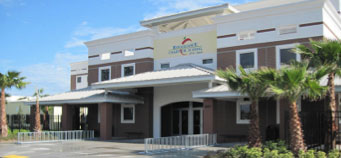TAMPA, Florida – As the debate over school choice continues to divide Florida educators, 10 Investigates found new ways charter schools companies are profiting off education.
Charter schools are tuition-free public schools that are authorized by – but not operated by – each school district. For each student who "chooses" a charter, his or her school gets state dollars that would have otherwise gone to the school district.
Charter Schools USA (CUSA) has been operating charter schools in Florida for 20 years, including recently-opened schools in Hillsborough County: Woodmont Charter, Winthrop Charter, and Henderson Hammock Charter. Although charter schools sometimes struggle financially at first, CUSA eventually collects a 5% management fee from each to provide administration and guidance.
But 10 Investigates found a much bigger pot of money CUSA has been able to tap into: rent. When the company helps open a new school, its development arm, Red Apple Development, acquires land and constructs a school. Then, CUSA charges the school high rent.
For example, Winthrop Charter in Riverview may struggle to balance its budget this year thanks to a $2 million rent payment to CUSA/Red Apple Development. The payment will equate to approximately 23% of its budget, even though CUSA CEO Jon Hage has been quoted as saying charter school rent should not exceed 20%.
Both CUSA and Winthrop Charter officials tell 10 Investigates that the schools are operated as nonprofit entities, and robust FCAT scores and happy parents are proof of success.
"Our mission is to take care of the kids; our mission is to give parents a choice," said Rod Jurado, chair for the Bay Area Charter Foundation, which oversees Woodmont, Winthrop, and Henderson Hammock charters. "But if we were losing money and not being able to make up the difference, we wouldn't be a school."
Jurado adds that many new charter schools ultimately fail because they lack the stability or resources that Charter Schools USA provides. The company operates 70 schools in seven states.
But among CUSA's critics is the League of Women Voters, which recently released a study suggesting a troubling lack of separation between a charter school's advisory board and for-profit management companies. It also indicates charter school teachers aren't often paid as well and profits all-too-often play a role in educational decisions.
"That means that children aren't getting what they're owed by the public funding," said Pat Hall, a retired Jefferson High department head and Hillsborough County's education chair for the League of Women Voters.
The study also revealed school choice creates a higher risk of disruption to a child's education, as "statewide closure rate of charters is 20%" and "Charters are 50% of all F-rated schools in 2011." In the last week, last-minute problems displaced a hundreds of charter school students from St. Petersburg to Delray Beach.
Hall acknowledges many charter schools are teaching children in unique and successful ways, but says Charter Schools USA isn't offering students anything that's not available in public schools. She adds that the schools are so focused on FCAT fundamentals, they forego many traditional aspects of the school experience.
While many CUSA schools may not have amenities such as a library or cafeteria, a company spokesperson said moving those amenities to the classroom can improve a student's learning atmosphere.
HILLSBOROUGH SCHOOLS VS. CHARTER SCHOOLS USA
As first reported by 10 Investigates, SDHC Superintendent MaryEllen Elia sent a letter to the county's three charter schools managed by CUSA, giving 90-day notice of her intent to pull their charters.
But the letters prompted immediate outrage among the Winthrop, Woodmont, and Henderson Hammock communities, where parents seemed happy with the education. Elia has since said she never planned on shutting the schools down, home to nearly 2,800 students combined, but her letter did not indicate so.
The concerns were over school oversight and whether decisions were being made by the local, nonprofit board, as the schools' contracts with the SDHC requires. At a recent school board meeting, Elia said she thought the schools were being led by Charter School USA, headquartered in Fort Lauderdale.
Jurado, a Hillsborough County native, vehemently denied the allegations, maintaining the board is independent, local, and active.
Other board members tell 10 Investigates the charter schools' supervisory board was poorly organized when the first CUSA schools opened a few years ago, but has gotten more organized and active since Jurado came aboard two years ago.
But the lines are not without blurring; Jurado's business card lists his title as "Board Chair, Bay Area Charter Foundation," but has a large "Charter Schools USA" logo across the top. He says he is not compensated by CUSA.
Jurado says his board has answered every school district question and demand and the lingering fight is merely Elia playing politics over an attempt to open a fourth school run by Charter Schools USA; a new charter at MacDill Air Force Base. The district denied its initial proposal last year, and has shown resistance to this year's effort as well.
Like other Hillsborough County charter schools run by CUSA, the MacDill proposal would include a new building and rent payments that would have serious impacts on its budget for decades.
BUILDING PROFITS BY BUILDING SCHOOLS
Charter Schools USA makes millions by managing schools, but tens of millions building and renting their buildings.
Because the facilities are used as schools, there are no property taxes. Because the schools are technically public, the bonds to pay them are tax-exempt. Yet the schools are expected to pay a much higher interest rate on their leases.
Winthrop Charter will pay more than $2 million this year in rent to CUSA/Red Apple Development, a 23% share of its budget. That's money that won't be spent in classroom resources or teachers. The equivalent interest rate on the lease is nearly 8%. No bid was put out for construction of the building; CUSA used the same preferred developer it always uses.
A spokesperson for Charter Schools USA says the payments reflect the amount of risk the company assumes when building a school. If the charter is revoked or the school is shut down, CUSA/Red Apple Development is stuck with an empty building with little resale value.
But charter schools don't always need new school buildings. Numerous charter schools in Hillsborough County retro-fitted older buildings, and only pay between 7% and 15% of their budgets to rent/bonds.
SPENDING (POLITICAL) MONEY TO MAKE MONEY
Charter Schools USA, its executives, and its subsidiaries have also spent millions of dollars to influence how laws are written in Florida.
State records reveal CUSA has donated $468,850 to candidates and committees at the state level since 2010. Most went to the Republican Party of Florida and other candidates/committees who support school choice.
CUSA CEO Jonathan Hage donated $50,000 to Gov. Rick Scott's "Let's Get to Work" committee in 2013, as well as thousands of dollars to other Republican candidates and committees. That includes four donations to various Charlie Crist campaigns between 2000 and 2006.
Other executives, Red Apple Development, and affiliated board members have thousands more.
State records indicate CUSA has also increased its lobbying expenditures every year since 2010, nearing $2 million in Tallahassee lobbying alone.
Executive lobbying expenditures, by year (only ranges provided):
- 2010 – Between 60,009 and 189,987
- 2011 – Between 100,007 and 209,989
- 2012 – Between 120,004 and 219,990
- 2013 – Between 230,004 and 379,985
- 2014 (first quarter) - Between 80,000 and 109,997
- TOTALS: Between 590,000 and $1.1 million
Legislative lobbying expenditures, by year (state estimates):
- 2010 – $165,000
- 2011 – $265,000
- 2012 – $270,000
- 2013 – $320,000
- 2014 (first quarter) - $95,000
- TOTALS: Between 590,000 and $1.1 million
The League of Women Voters also identified numerous legislators with connections to Charter Schools (Read Page 13), but none associated with Charter Schools USA, although state Rep. Jamie Grant, R-Tampa, sits on the volunteer Bay Area Charter Foundation board.
Asked about spending money on politics instead of in the classroom, Jurado pointed to the hordes of happy parents and thousands on CUSA waiting lists in Hillsborough County.
"I don't think the parents are going to look at this as, 'that's too much money to spend,' when they see the results from the child," Jurado said.
Find 10 Investigates reporter Noah Pransky on Facebook or follow his updates on Twitter. Send your story tips to noah@wtsp.com.


